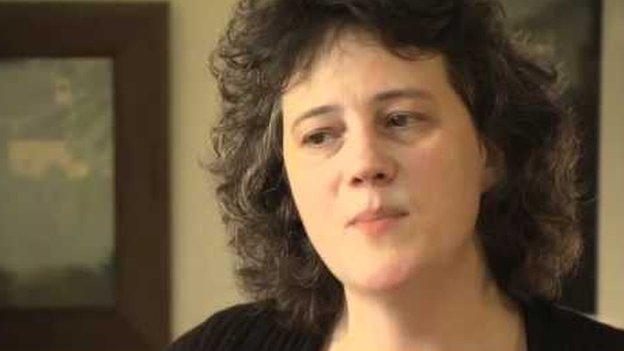'I was told I was too glamorous to do a good Burns speech'
- Published
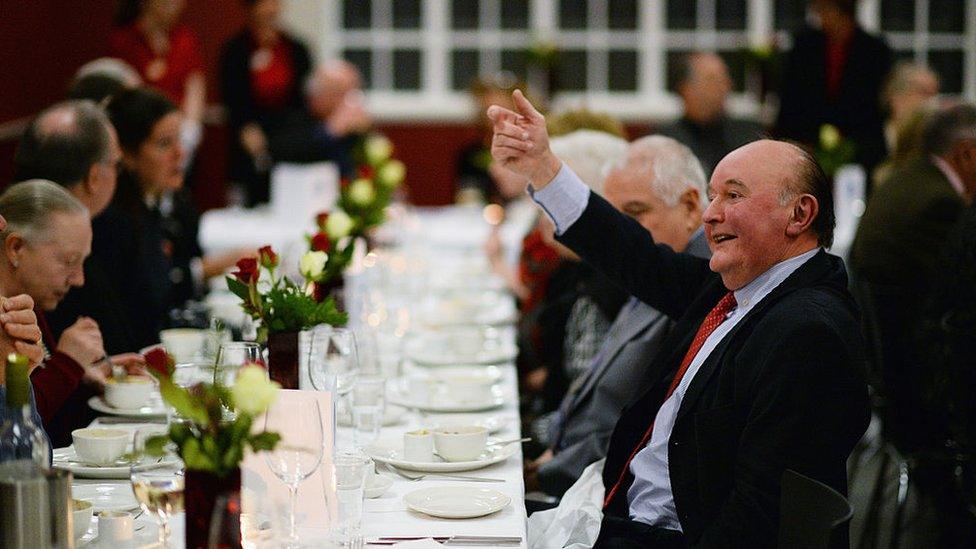
Burns clubs have been traditionally male environments but women are breaking down barriers
For years, the clubs set up to preserve and celebrate the rich literary legacy of Robert Burns have been traditionally male environments.
They followed the lead of the Bachelors' Club, a men-only debating society set up by Burns and his brother in Tarbolton, Ayrshire in 1780.
It was only in 2015 - more than 200 years later - that Prof Kirsteen McCue became the first woman to deliver the toast to the immortal memory at the Bachelors' Club Burns supper.
But in 2024 some Scottish Burns clubs still have no female members.
Women like Prof McCue, Isabel Lind, and Kerry Burley - leading figures on the Burns circuit - say female inclusion has improved, but there is still a long way to go to change entrenched attitudes.
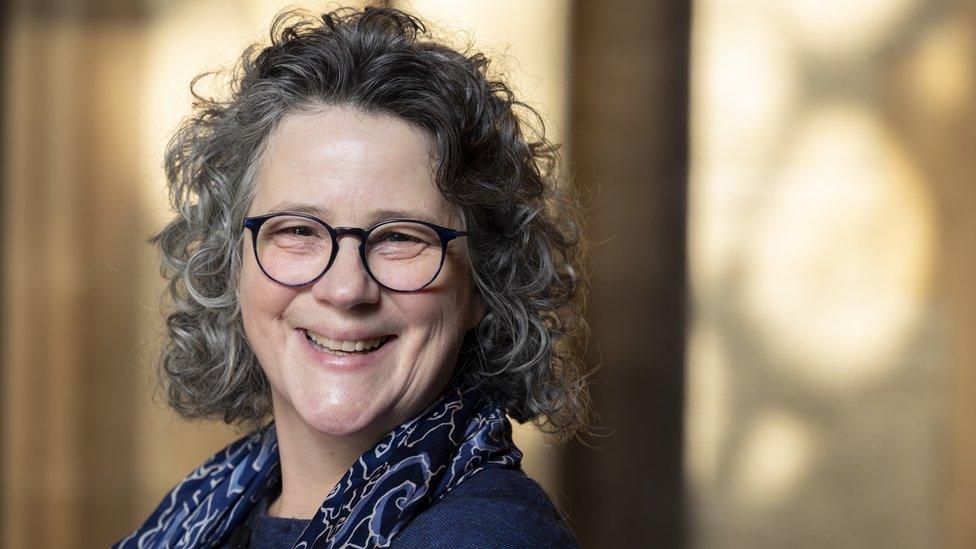
Prof Kirsteen McCue is a leading authority on Burns
Prof McCue, the former co-director of the Centre for Robert Burns Studies at the University of Glasgow, said her invitation to speak at the Bachelors' Club was not universally popular.
"That was a big deal, it was a really big thing to be asked," she said.
"The night certainly warmed up, there was definitely a tension in the air but it ended up being one of the best Burns experiences I've ever had.
"I found out afterwards that some of the committee had not been overly supportive of having a woman speak, but I did not get that sense on the night.
"I can understand the hesitance, they were breaking their tradition but I would say it was the right thing to do."
Meanwhile Kerry Burley, who has been a regular at Burns suppers for more than a decade, is about to become president of Sandyford Burns Club in Glasgow.
"I've been doing immortal memories at Burns events since my late 20s and everywhere you go you get a lot of looks up and down, folded arms and scoffing. I do enjoy shutting them up," she said.
"I gave a toast just the other day and a man came up to me after and said he thought I was too glamorous to give a good speech, but he had been proven wrong.
"One of the speeches known as the toast to the lasses is often full of dirty jokes, some of the jokes told when I was first on the scene would be considered hate speech nowadays. But there is more gentleness now."
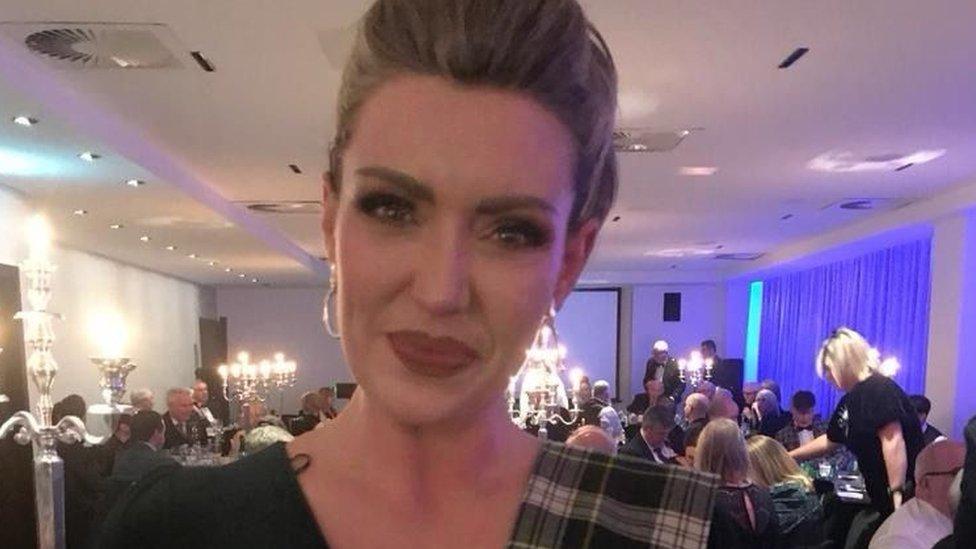
Kerry Burley wants to encourage more women to give involved in the Burns community
Ms Lind, the vice-president of Greenock Burns Club, one of Scotland's longest-running clubs, says she has noticed a change in attitudes over the years.
It has welcomed women since 1980 and she is due to become its president for a second time.
"The first time I was president of the club in 1996, I was not invited to meetings with other clubs, which meant that our club wasn't represented at these meetings," she told BBC Scotland News.
"They wouldn't have us because we had a woman president. Things have gotten a lot better since then but there's still a way to go."
How many Burns clubs are exclusively male?
There are 131 affiliated Burns clubs in Scotland, according to the Robert Burns World Federation, as well as many more around the world.
They celebrate Burns Night and organise events throughout the year such as poetry readings, themed dinners, and educational initiatives.
New Cumnock Burns Club and Glasgow Haggis Club are among those which remain male-only, or "stag clubs", but official figures on the total number are not held.
Jon Wilson, the new president of the New Cumnock club, said they had never had a female member - but there was nothing in the constitution banning women from joining.
"Every member be it male or female, would have to be approved by the committee before becoming a member," he said.
"We look at your standing in the club, and obviously some personal bias may come into that. Somebody must propose you and it needs to be agreed by everybody, or at least a majority."
Mr Wilson said the strict membership process was to "protect club numbers" and to ensure the club had a "good, clean" supper.
"At every event, apart from our supper, we have female guests. It's just been that traditionally our supper has been a male-only event, and that's been for the last 100 years," he said.
A spokesperson for Glasgow Haggis Club confirmed their club remains male-only.
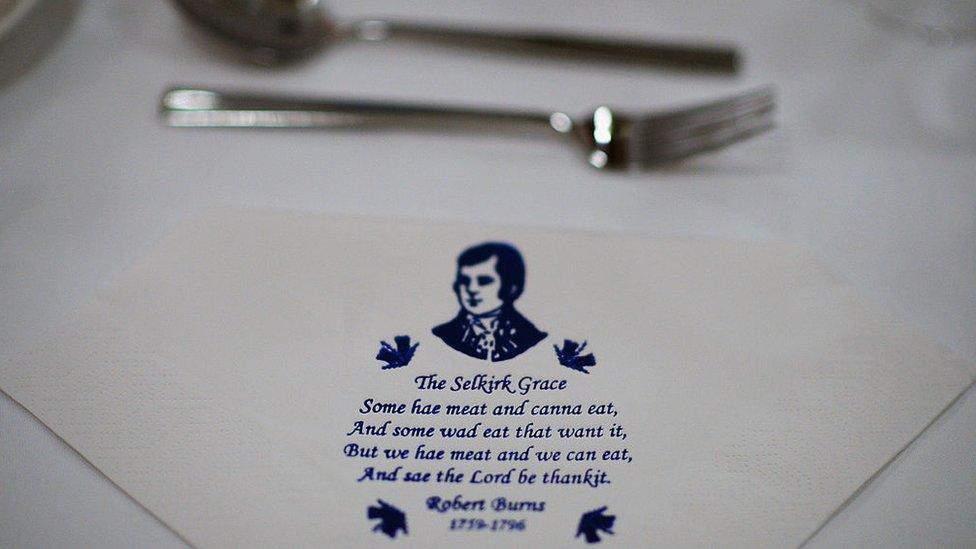
Other clubs might invite women to give speeches, such as the immortal memory or the reply from the lassies at their events, but they stop short of allowing them to become members.
Change is happening though.
Last Friday, for the first time ever, 10 of the 83 attendees at the Montrose Burns Club's supper were female and members have recently approved a new club constitution making the club "inclusive to all".
And last year, Bridgeton and Dumbarton Burns clubs also voted to welcome female members for the first time.
Under her presidency of Sandyford Burns Club, Ms Burley wants to encourage more women to join and to have an all-female top table at next year's Burns supper.
"Being a millennial, I was kind of outraged that women who had been involved in the clubs for decades are still being denied memberships," she said.
"I understand the need for men's spaces, but the difficulty is so many Burns clubs are dying and you are missing out on 50% of your membership.
"This isn't tirade against stag clubs, but I would say to them: 'Give it up boys'.
"I understand the traditions of your club however the world has changed, the world will continue to change."
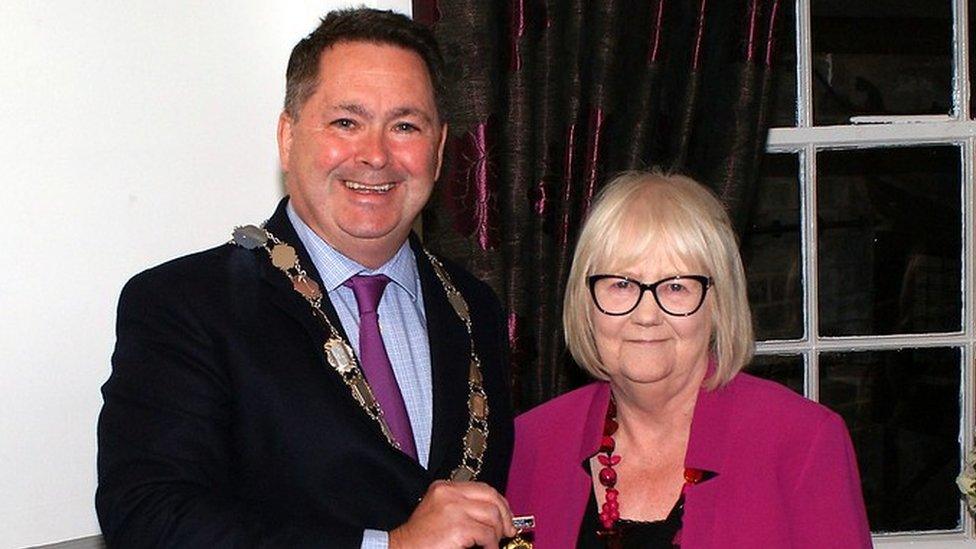
Isabel Lind says a lot has changed since she was last president of Greenock Burns Club
Prof McCue said it was important that Burns clubs move with the times.
"I think what's unfortunate is in the 21st Century this [male-only clubs] is becoming a social abnormality. Everything we work on now, we are trying to achieve diversity," she said.
"So what was a social norm when many of these clubs were created, isn't a social norm now. I think it's a big problem for organisations like Burns clubs that are made up of older members."
In Greenock, Ms Lind said a lot of her club's community work is led by women and the Bard himself would not have approved of any ban on women.
"I think he would want women to be members, he admired women a lot and had a great gift with females.
"He wrote about the rights of women away back then, he spoke about his great admiration and the decorum of women.
"It's amazing he was writing about that in those days."
Related topics
- Published18 March 2018

- Published23 January 2015
